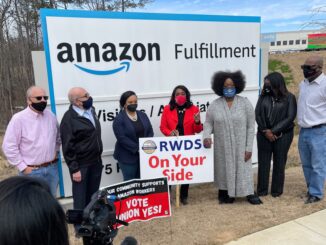
Reprinted from In These Times by Hamilton Nolan on December 10, 2020.
“Ken Lewis grew up on the island of Grenada, and witnessed the progressive aftermath of its 1979 revolution,” writes Hamilton Nolan in In These Times. “’I remember the power of cooperatives, people getting land, turning places that were barren into productive places,’ he says. That image stayed with him after he moved to New York City for grad school and started driving a taxi on the side. Now, several decades later, Lewis is finally getting a chance to put the power of cooperatives into practice, in service of the drivers he worked with for so long.
“He is one of three cofounders of The Drivers Cooperative (TDC), which aims to realize a long-held dream of socially conscious New Yorkers in a hurry: a ridesharing app that you can feel good about. When it rolls out to the public early next year, TDC will become New York City’s first worker-owned ridesharing platform — owned by the drivers themselves, rather than by big investors and executives. Its founders’ brazen idea is that TDC can actually gain a competitive advantage over Uber and Lyft — saving money and funneling those savings back to drivers — by doing away with the most exploitative practices of that dominant duopoly. ‘The way the [Uber] model is organized is extractive. It takes out the money and doesn’t give back much. Imagine a company that doesn’t have any profits, but has created billionaires,’ Lewis says. ‘That money comes from drivers.’
“Erik Forman, a veteran labor activist and organizer, became intimately acquainted with the dark side of that extractive model when he was working as a staff member at the Independent Drivers Guild, a union-affiliated group that organizes rideshare drivers in New York. Companies that operate in the industry regularly push much of the risk of employment onto the drivers by classifying them as ‘independent contractors’ rather than employees. But they also push the costs of the job onto the workers, forcing them to pay for their own car and maintenance (not to mention things like healthcare benefits). Instead of being paid to work, in other words, ridesharing apps — like other ‘gig economy’ companies — make people pay in order to work. When Uber launched in New York City in 2011, it was an attractive alternative for many who had previously been taxi drivers, with decent pay and little regulation. But in subsequent years, Uber cut pay rates while the number of drivers rose, leaving many who had taken out loans to buy cars for their job struggling to meet their debt obligations and earn a living. …






